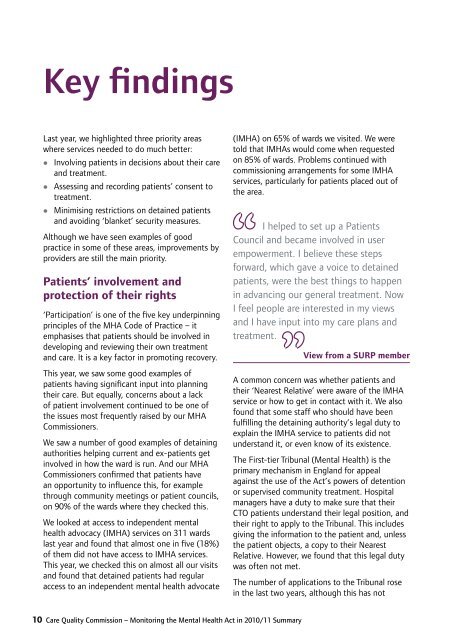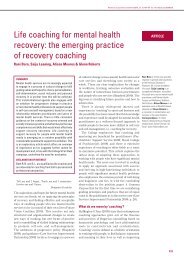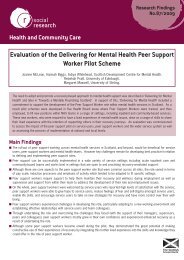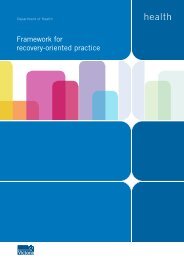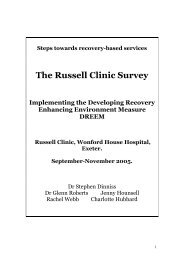Mental Health Act Annual Report 2010/11 - Care Quality Commission
Mental Health Act Annual Report 2010/11 - Care Quality Commission
Mental Health Act Annual Report 2010/11 - Care Quality Commission
Create successful ePaper yourself
Turn your PDF publications into a flip-book with our unique Google optimized e-Paper software.
Key findings<br />
Last year, we highlighted three priority areas<br />
where services needed to do much better:<br />
• z Involving patients in decisions about their care<br />
and treatment.<br />
• z Assessing and recording patients’ consent to<br />
treatment.<br />
• z Minimising restrictions on detained patients<br />
and avoiding ‘blanket’ security measures.<br />
Although we have seen examples of good<br />
practice in some of these areas, improvements by<br />
providers are still the main priority.<br />
Patients’ involvement and<br />
protection of their rights<br />
‘Participation’ is one of the five key underpinning<br />
principles of the MHA Code of Practice – it<br />
emphasises that patients should be involved in<br />
developing and reviewing their own treatment<br />
and care. It is a key factor in promoting recovery.<br />
This year, we saw some good examples of<br />
patients having significant input into planning<br />
their care. But equally, concerns about a lack<br />
of patient involvement continued to be one of<br />
the issues most frequently raised by our MHA<br />
<strong>Commission</strong>ers.<br />
We saw a number of good examples of detaining<br />
authorities helping current and ex-patients get<br />
involved in how the ward is run. And our MHA<br />
<strong>Commission</strong>ers confirmed that patients have<br />
an opportunity to influence this, for example<br />
through community meetings or patient councils,<br />
on 90% of the wards where they checked this.<br />
We looked at access to independent mental<br />
health advocacy (IMHA) services on 3<strong>11</strong> wards<br />
last year and found that almost one in five (18%)<br />
of them did not have access to IMHA services.<br />
This year, we checked this on almost all our visits<br />
and found that detained patients had regular<br />
access to an independent mental health advocate<br />
(IMHA) on 65% of wards we visited. We were<br />
told that IMHAs would come when requested<br />
on 85% of wards. Problems continued with<br />
commissioning arrangements for some IMHA<br />
services, particularly for patients placed out of<br />
the area.<br />
I helped to set up a Patients<br />
Council and became involved in user<br />
empowerment. I believe these steps<br />
forward, which gave a voice to detained<br />
patients, were the best things to happen<br />
in advancing our general treatment. Now<br />
I feel people are interested in my views<br />
and I have input into my care plans and<br />
treatment.<br />
View from a SURP member<br />
A common concern was whether patients and<br />
their ‘Nearest Relative’ were aware of the IMHA<br />
service or how to get in contact with it. We also<br />
found that some staff who should have been<br />
fulfilling the detaining authority’s legal duty to<br />
explain the IMHA service to patients did not<br />
understand it, or even know of its existence.<br />
The First-tier Tribunal (<strong>Mental</strong> <strong>Health</strong>) is the<br />
primary mechanism in England for appeal<br />
against the use of the <strong>Act</strong>’s powers of detention<br />
or supervised community treatment. Hospital<br />
managers have a duty to make sure that their<br />
CTO patients understand their legal position, and<br />
their right to apply to the Tribunal. This includes<br />
giving the information to the patient and, unless<br />
the patient objects, a copy to their Nearest<br />
Relative. However, we found that this legal duty<br />
was often not met.<br />
The number of applications to the Tribunal rose<br />
in the last two years, although this has not<br />
10 <strong>Care</strong> <strong>Quality</strong> <strong>Commission</strong> – Monitoring the <strong>Mental</strong> <strong>Health</strong> <strong>Act</strong> in <strong>2010</strong>/<strong>11</strong> Summary


